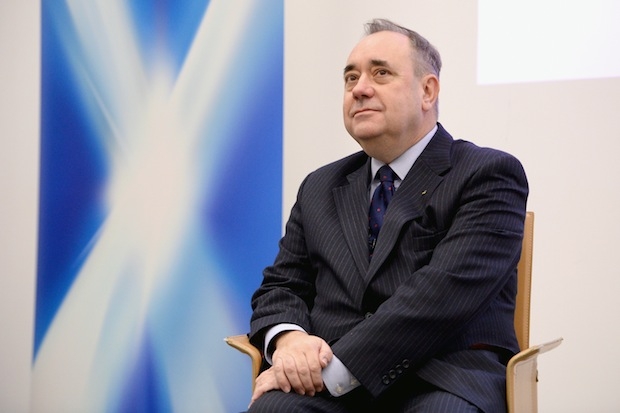Within the white paper on economic policy in an independent Scotland that was published by Alex Salmond’s government this week there is a liberal economic manifesto trying to get out. The First Minister speaks about using new ‘levers and instruments’ to revive Scotland and that, freed from Westminster control, he might lure businesses by slashing corporation tax, reducing national insurance contributions and cutting air passenger duty.
Unfortunately, none of these ideas is likely to get off the page because the SNP has a much more prominent agenda which could not have been better designed to promote economic stagnation. This one promises more generous welfare, a higher minimum wage, renationalisation of the Royal Mail and possibly setting up workers’ councils whose views on management companies would be obliged to take into account. We can see what a Scottish workers’ council would look like, in the shape of Unite at the Grangemouth oil refinery.
It is difficult to say what kind of party the SNP would be were its uniting policy — the demand for Scottish independence — to be achieved. Salmond’s tactic has been to use the language of the right (enterprise, jobs, tax competition) and offer the policies of the left (nationalisation, massive welfare and state spending). While the SNP flirts with economic liberalism, it remains at heart a high-spending party of the left which has shown no inclination to contemplate what would be necessary to sustain a low-tax policy: namely to cut spending and shrink government.
This week’s white paper is a triumph of wishful thinking over reason. It asserts that after independence, ‘Innovative, high–value firms are more likely to export and to invest in research and development.’ How come? It doesn’t say. We learn that an SNP-led independent Scotland would ‘establish an industrial strategy which rebalances the economy and diversifies Scotland’s industrial base, promoting manufacturing innovation and boosting production’. But how is this to be achieved, given that the Westminster government has been struggling to do the same for the whole of the UK since the banking collapse in 2008? Answer comes there none.
There will be ‘targeted measures to reduce the outflow of labour and attract skilled workers to enhance Scotland’s population growth’. A little reading reveals these measures to stretch little beyond slightly higher subsidies for childcare. Yet Scottish families already enjoy more generous childcare, funded in part by the Barnett formula — which ensures £118 is spent on a Scot for every £100 spent on an Englishman. Scotland’s birth rate is significantly lower than England’s. If bungs-for-bairns is not working now, why should it do so after independence, when Scotland would have to fund them from its own resources?
In any case, when non-Scots do turn up north of the border to take advantage of free and subsidised public services, the SNP doesn’t tend to like it. A few weeks ago the Scottish government committed to closing a loophole whereby Northern Irish students can qualify for free tuition at Scottish universities by exercising their right to take a Republic of Ireland passport. It has also looked at introducing a ‘management fee’ to deter students from elsewhere in the EU taking advantage of free tuition fees.
The university sector is one which the SNP says it would seek to encourage after independence. But there is nothing stopping it boosting the university sector now: higher education is a devolved matter. Instead, it has chosen to starve Scottish universities of cash by insisting that Scottish students pay no tuition fees. For the moment, the funding gap is being plugged by extra money from Holyrood, but over the years lack of an income from Scottish students will become increasingly apparent.
Salmond has a reputation as a formidable late-stage campaigner, and even some of David Cameron’s closest advisers think a victory for him next year is not just possible but probable. It is, of course, true that Scotland is big enough to be independent. So is Andorra, and the other principalities who can be seen popping up to vote in the Eurovision song contest. But Salmond’s great weakness is the pointlessness of his mission. As he starts to publish detailed plans for Scottish independence, his bluff is slowly exposed. Independence solves no Scottish problem. It would give Edinburgh’s politicians more power, but would likely make the Scottish people poorer — and less free.
Big government impoverishes, and that is what Salmond is offering. So if his referendum is to be won, it is unlikely to be thanks to entrepreneurs reading this week’s white paper and holding out the prospect of shifting job-creating businesses to Scotland. What they will read is a fantasy prospectus which proposes to have its mealy pudding and eat it. This cannot last. If Scots are being asked to tear up their country and make foreigners out of their friends and family in England, then it should be for a very good reason. As the SNP’s economic plan has shown, it does not have one.
The debate should be only just beginning. Alex Salmond should be forced to decide whether an independent Scotland would be a low-tax, small-government haven of business — or a high-tax, public-sector-driven economy which clings to its welfare comfort blanket. He cannot get away with telling us that Scots can have both.






Comments